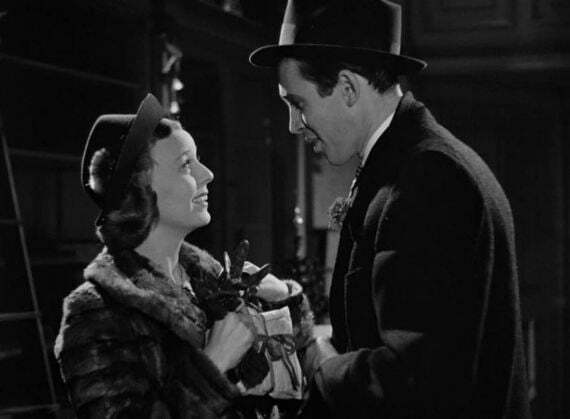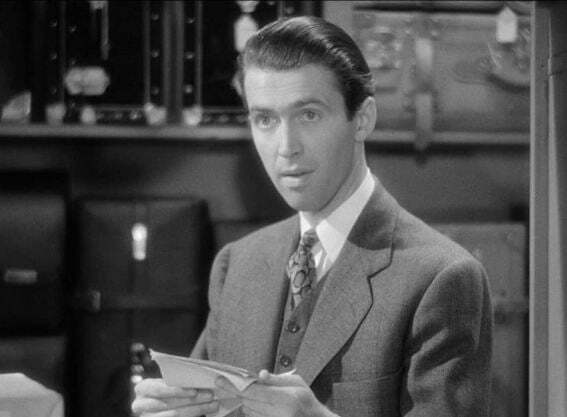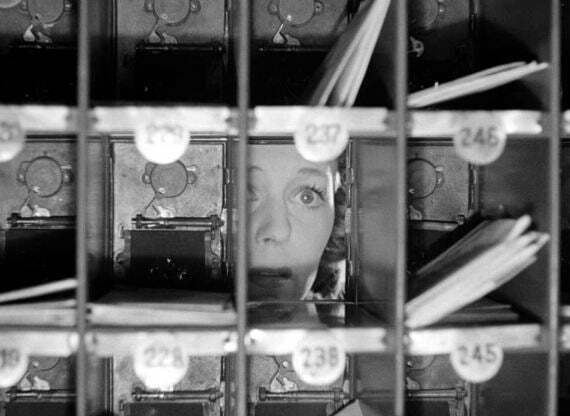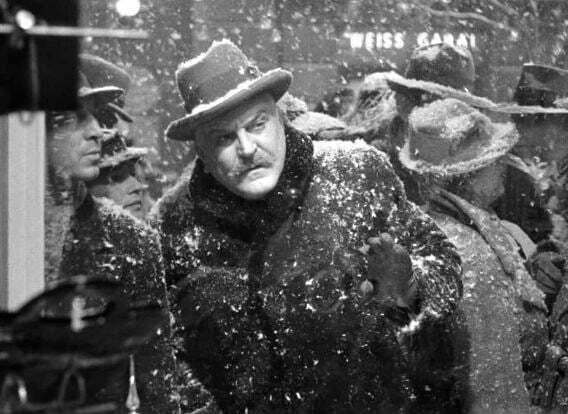
There are those touchstone films that you have to see every now and again. Not obsessively, but occasionally – the old friend met once every few years, yet without whom you would not know where you are. You know every scene, every word is familiar to you, but you must see it again. It is not so much that the film matters to you but that you matter to the film. It needs you and your kind to understand it best. Cinema is a two-way phenomenon.
So it was that I watched The Shop Around the Corner (USA 1940) for the first time in a while. I have seen the film many times over three decades or more and it was exactly as I remembered it, in content and feeling. It is the most comforting of films. It tells of the romance by accident of Alfred and Klara, employees of a Hungarian clothes shop, played by James Stewart and Margaret Sullavan. Each engages in a correspondence with another they have not met, hoping that the unseen person is the love of their dreams, while battling with the colleague they think is anything but their ideal. If the plot sounds familiar, that’s firstly because this premise goes back at least as far as Shakespeare’s Much Ado About Nothing, while The Shop Around the Corner itself was remade as a musical with In the Good Old Summertime (USA 1949), as a Broadway musical She Loves Me (1963) and then as the film You’ve Got Mail (USA 1998).
The specific source was a Hungarian play by Miklós László, Illatszertár, or Parfumerie, which explains the location of The Shop Around the Corner. A key element of the film’s success is its setting in a middle Europe that is viewed with nostalgia but without false sentiment. The characters have Hungarian names, the books and newspapers that they read have Hungarian text, the currency on the cash register (pengő and fillér) is Hungarian, the shop is Matuschek and Company, a name whose euphonious quality forms a refrain throughout the film. It is a gently realised other world, whose petty details make it our world too.

Its particular quality lies in how it blends fantasy with realism, the romantic with the inevitable. Time and again the film escapes the formulaic by grounding itself in real life. Its mundane setting gives it a special quality, matching the ordinary yet engrossing lives that the majority of us somehow lead. The verbal exchanges ring true because they have the right acerbic quality about them. There is an irregularity to the rhythm of the narrative whose credibility satisfies the viewer. A witty script, from Samuel Raphaelson and an uncredited Ben Hecht, takes wings through direction that is skilfully attuned to how our minds work. We recognise the wit of the style almost ahead of each exposition of that wit. Lubitsch makes us smile at how we are able to see things.
The Shop Around the Corner has seen its reputation grow over the years. In Leslie Halliwell’s original Film Guide (1977), a reasonable barometer of traditional taste, the film gets a moderate two-star rating (out of four), Halliwell describing it as a “pleasant period romantic comedy which holds no surprises but is presented with great style”. Latterly, the film’s unaffected sweetness, several winning performances, and the ingenuity of its seemingly simple construction. have made it the model film for some. Summing up this feeling, Pauline Kael, in her 1991 collection 5,001 Nights at the Movies, called the film ‘close to perfection’.
But what on earth does close to perfection mean?

For a film to be almost perfect implies that there is such a thing as the perfect film. A film in which all the required elements cohere perfectly, that sustains a sublimity of content and form for the entirety of its duration (which must be the ideal duration for its particular content and form), and that has a particular excellence about it. There will be films of moderate ambition in which all of the elements may combine ideally, but suggest nothing elevated. Excellence is the prerequisite of perfection.
There are reasons, in my eyes at least, for thinking The Shop Around the Corner to be a little less than perfect. The ousting of the duplicitous Ferencz Vadas (Joseph Schildkraut) from the shop takes too long and is a little clumsily executed. The final gag, in which Alfred raises his trousers for Klara, to show that he is not bow-legged, is a weak piece of comedy unworthy of all that has preceded it. Both of these, this viewer feels, might have been emended, making the film – maybe – perfect. Thus the viewer senses perfection through the imperfections. Any film, any art work, contains the promise of its own perfection.
Of course others – starting with Leslie Halliwell – do not see the film as being perfect, or close to perfection, which must mean that perfection is a subjective concept. Many, if asked to watch the film now, will reject it simply because it is in black and white and is acted in a way that no one acts now. Time and taste, however unkindly, have made the film for the majority to be a period piece, an object with tarnished values. Subjectivity suggests that the perfect film is a logical impossibility. It is not an object itself, it is an aspiration.
This may be what Pauline Kael meant. Every film – and any other creative work – suggests its own perfection, and because this is so it can never realise such perfection. The film carries with it its Platonic ideal – that form in which Valdas is dismissed satisfactorily, and in which Alfred’s legs do not feature, and yet nothing is lost. But others may find the film close to perfection were it only that other tiny blemishes were amended, so that the perfection of the film in their view would be different to mine. Yet others may not see blemishes at all and call the film perfect, and that is that. Their subjectivity has become objectivity. But logically, because this applies only to them, it cannot be. The perfect film can never be absolutely perfect.

Ironically, or appositely, the film provides the answer to the conundrum. The Shop Around the Corner is about finding the perfection in imperfection. Three characters represent facets of this. Although Alfred and Klara would seem to be similar in their quest and their delusion, there is a difference. Alfred’s uncertainty about himself makes him realise early on that what he wants is not the impossible but merely the possible. Pirovitch questions him about what he is seeking:
A: I haven’t slept for days.
P: I’m sure she’ll be beautiful.
A: Not too beautiful. Oh, what chance would a fellow like me…
P: What do you want, a homely girl?
A: No, no. Now, you-you knock on wood for me. Just a lovely, average girl. That’s… that’s all I want.
Alfred wants the complement to his humble self. Klara, however, dreams that her lover will have all of the grace, intelligence and understanding that she wishes for herself. But she betrays herself through her admission that she had originally been attracted to Alfred – “In those first few weeks, there were moments in the stockroom when you could have swept me off of my feet” – without which admission the film would not resolve itself. Now Alfred can declare his love for Klara, but first he has to dismantle her belief in the imaginary person she thought was her ideal:
K: I’d built up such an illusion about him. I thought he was so perfect.
A: I had to come along and destroy it.
Now they find that complement one another. Each discovers that the person before them is better than their dreams had told them they would find. They are almost perfect for each other. So theme and style dovetail: fantasy with realism, the romantic with the inevitable. It is everyone’s love story (or should be).

The third character who has sought perfection is the film’s linchpin, the shop owner Hugo Matuschek, played by Frank Morgan. This benevolent capitalist, so proud of his shop and so in command of his little world, seems to have the life of his dreams. But then he discovers his marriage is a sham. A private detective confirms that his wife is having affair with one of his staff (though not the one he has suspected), at which he says:
Twenty-two years we’ve been married. Twenty-two years I was proud of my wife. Well, she just didn’t want to grow old with me.
Mr and Mrs Matuschek were once Alfred and Klara, and we may be too blinded by the Christmassy setting and the happy conclusion to see the sadness that underlies our story. “This is my home – this is where I spent most of my life” says Matuschek of the shop, as he makes his speech at the end to the staff, but the ruefulness of this sentiment escapes all of them. Matuschek thought he knew perfection, and now knows only himself.
The same story, with the same people, learning the same vital lessons about the ideals that they seek, is happening just around the corner – any corner, at any time. This is what makes The Shop Around the Corner such a fine, such a timeless film. But not the perfect film. It knows too much for that.
A version of this post is included in my book Let Me Dream Again: Essays on the Moving Image (Sticking Place Books, 2025)
Very well said that man! Really enjoyed your analysis here – charm can be so hard to pin down!”Part of the appeal also derives from its Christmas spirit (as it were), something that even brings the likes of Die Hard and the Hammer thriller Cash on Demand closer to perfection. And indeed both of those films also concern themselves with an ideal and question its place and achievability in the midst of a more quotidian existence. Must be years and years since I looked at my Halliwell – way back when, there probably wasn’t a day that went by without my scrutinizing its pages.
Thank you, as always. Halliwell was one of my initial guides into film, and I still find him a helpful means by which to measure things. I wrote an appreciation of the Film Guide some years ago: https://lukemckernan.com/2010/09/05/recommended-reading-no-4-halliwells-film-guide/
An excellent discourse Luke, with plenty of food for thought.
I’m not pretending that you don’t already know, but the ‘perfect’ film has to be wholly subjective by definition of course, as does what perfection means to each person; and even that personal definition is subject to change. My go-to “‘flu film” is “Oh Mr Porter!” and, whilst I’m not arguing that it is a cinematic milestone, it’s pretty much perfect for me in those circumstances. Other close-to-perfect films for me are “A Canterbury Tale” and “Pather Panchali”, but context is all; both when one first saw the film and why one revisits it are key to deciding on the application of the epithet of near perfection.
Thank you, glad you liked the discourse. Naturally everyone’s idea of perfect must be different – so there cannot be any absolute perfection. That said I would find it hard to find any fault at all with Oh Mr Porter and Pather Panchali. But A Canterbury Tale needs to lose the glue.
I have to give it to you about the glue Luke! Can I get away with calling it the grit in the oyster?
Subtle.